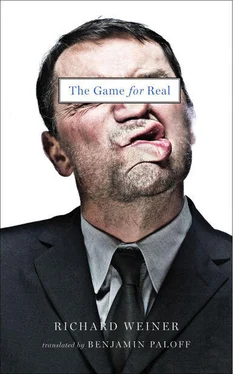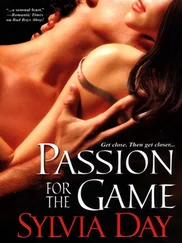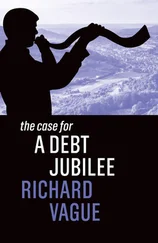He empties the drawers. What would he save, what would he withhold? In the drawers, it’s all the same old junk. The goods, the goods are not to be found. They’re his, his forever. –
He’s drinking; drunkenness drags itself in from all sides; it’s not drunkenness from drinking. What’s intoxicating is this rapid alpine huntsmen’s march banged out on that xylophone and its rather harsh tones. The harsh tones! Each of them so self-confident, so distinct, as though tipped out of a mold. With such sharp contours you’d say they’d been minted. Who’s that playing the xylophone? No one. It plays itself. Red, white, yellow, opal glasses on the tables, like nobody’s business: a sham! The blistering alpine huntsmen’s march on the xylophone is their pied piper. It’s the music of the spheres; and the music of the spheres is too substantial to be consumed by the ear. Or don’t you see it? Or else wouldn’t you see it if the colored quality of the aperitif glasses were to take wing? Listen! Don’t you see the red, gold, brownish, and opal sounds, see them rushing, see them jostling on the glass bridges, so not to miss the rally? Look! Don’t you hear the heads of their unfurled offensive lines twist suddenly, charmingly, skirting a kind of magnetic focal point, languidly and in vain? The eccentric courage of the spirals they’ve initiated is slowly mounting. Only that still higher, ecstatic self-confidence, and behold, from the spirals, unprotected and open to foreign incursions, delicate orbs. The alpine huntsmen’s march had been straightforward, but now it’s swerved angrily away from the straightforward. It’s swerved into the voiceless quadrille of whirling milky orbs, do you see them? Do you hear the revolts of the seven lights breaking out within them, in long, unhurried intervals? The advertising globes of steamship companies. A quadrille, hasty as mayhem and hurried as discipline. A quadrille of spinning orbs skewed toward a common ecliptic, along which they are sliding smoothly toward a still quieter and more spirited iridescent orb, which devours them. It rises charmingly, you’d say it was spherical lightning. Look, it’s over their table, over the table of the efficacious vivisection. It floats neutrally, like an air bladder tossed in an evening dance hall. It spins every which way with nose-diving apathy.
His confessors are here: with carefree casualness, self-confidently composed people, whose metaphysical bread and butter had been confronted by the coziness of the armchairs at the club; theirs had patronizingly consented to start resembling the exceptionally iffy chairs of cafés: the discreet overtone of professional Spartanism suits these upper-crustily spoiled judges, and a judge’s prestige awaits them. Their aloofness, the imperious sangfroid of their grudge, their icy and patient curiosity are as tidy as cultivated, though already domesticated, plants. He was encircled by the unwitting solidarity of the four researchers immersed in a common problem, they’re keeping a close guard on him, like guards around a post-mortem specimen dearly acquired, and anaesthetizing him with a narcotic of alternating and rhythmic “dear friend,” “friend,” “oh!” “how very odd!” “really?” “can it be?” “how could you?” –
He, too, sees himself askew. He sees himself as a conjurer spinning an endless paper ribbon with signs of Morse code from his maw. The marks are voluminously concrete, and these concrete signs create a chain, and that chain represents an occurrence. It is an occurrence: that which has occurred— somewhere, somehow, to someone. This occurrence concerns him unintentionally, yet he is well aware that between the two of them there is a close relation, he’d happily pronounce it, now it seems to him that the quality of that relation is that of the words “I am responsible for everything that happens,” but when he has these words already on the tip of his tongue he realizes that that’s not quite it.
He pulls the sort of paper ribbon with its signs from his throat, but by now they’re not written down so much as signs just now being written, the writing from Belshazzar’s feast: written in bluish light like that which torments mercury lamps, and each mark was visibly impressed into a cartoon figure as well, but with a different light.
He hears himself talking, he’s speaking the bluish words, and around each the tremulous and sparkling contour of a word of confession: in sum, a kind of moving electric advertisement trotting from darkness, where it lights up, into darkness, where it goes out.
He’s looking at the current of confessional words which he hears, and he finds it strange that those who pronounce them are also looking at them, and also as though at foreign words; they’re reading with the distracted interest of loiterers on the boulevard:
“A pronounced case of deficient will. .” — “Passive tolerance of injury as an indication of subconscious criminal inclinations. .” — The inscription, “The surest guarantee of moral depravity is approving of one’s own ill treatment, it applies to everyone, present company excepted,” flew by faster than the inscription that had preceded — somehow with a provocative shyness — but now we have the luminous question: “Who folds his hand when he has mostly trumps?” into the encouragement of which there spurted “A cheat in dire straits,” and it drained away. “Or else a super-lucid Polycrates” passed with ironizing sluggishness, which courted the exhortation: “All of you who are suffering for a crime not committed, bring about justice by redeeming the crime after the fact. .”
Here, however, the jotting’s trotting was suddenly cut off, and with so sheer a suddenness that everyone, people and things, and even the trot itself, seized and chopped, shut down before an as-yet mysterious cause, almost irrevocably. For it had come right up to the slope leading toward the unsightly catastrophe, along which the town’s ramparts crashed toward the little river, clinging to the bulwarks tailored to those two sycamore promenades, toward one of which, the smaller, he maintained an almost human amity. Where had this safety-memory come from? Safety, since it propped up his crashing presence of mind: he tugged at the reins, he tugged them with a strength he hadn’t expected of himself, and which revived the pride within him. The café’s “happy hour,” which had reared so dangerously, settled back down and trotted as before.
“And why not?”—he heard himself—“and why not? He was beautiful.”
It was a response (it half-rose), it was his response to some “no way! come on, no way!” which, having first taken fright, threatened some quiet sentence that he had interposed immediately before. The sentence died away in his memory; all that remained of it was the recollection that he had been saying it with his head lowered, as if he were reading from the light mahogany table where they were sitting.
And again those rushing aural figures with contours of tremulous light, except perhaps the slightest bit fainter, more personal, no longer sententious messages to EVERYONE, now just inquisitional questions to HIM:
“Didn’t it occur to you that that event was the complement of the mishap at Benedictine Mill?” — “Since when do you have this magical attraction for wretches and lowlifes?” — “Maybe you exude caritas ? Maybe it’s predestination?” — “Then again, the dead do fear the living, and they’re all over you.” — “Like biting flies on rotten meat.” — “Why don’t you defend yourself against them?” — “Either you can, or you can’t.” — “The living can’t not defend themselves — in your place, I’d have been afraid!”
After the word “afraid,” the emboldened spiral intervened, and the trot, straightforward till now, broke into a whirl. And it was a smooth transition, through the sudden rotation of two quite disagreeable movements. The temporal divide between the two was a hair’s breadth, and that hair sounded briefly, as though with the echo of something overheard somewhere and sometime before: “But see who’s here? And why the long face?”
Читать дальше












